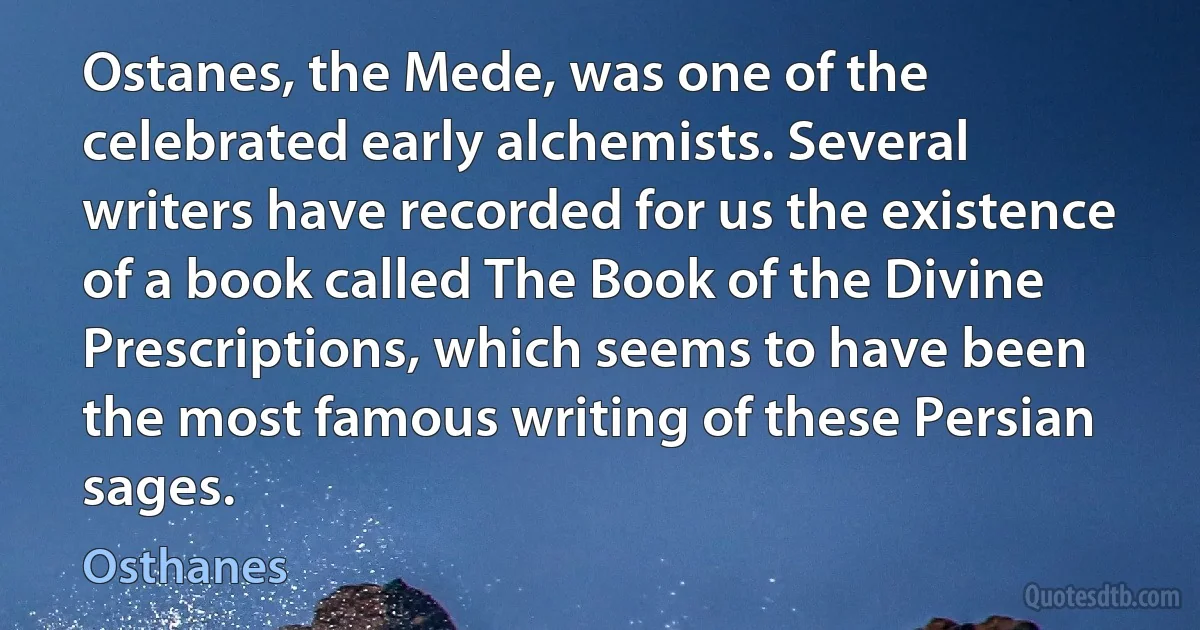Persian Quotes - page 4
Khamenei is certainly better educated than the late Khomeini. At least he can speak and write correct Persian and Arabic, something the late Ayatollah never managed. From available evidence Khamenei also has a better knowledge of Islam and its history than Khomeini did. Nevertheless, Khamenei has never been accepted as a theologian or Islamic scholar, but as a political leader, bestowing on him a degree of dangerous ambiguity. That ambiguity enables him to hit much higher than his weight by using his political position as long as the going is good. However, the slightest sign that his political power may be on the wane or seriously challenged could expose him as a prophet without armor. And that, in the context of Iran's violent politics, created of the same substance as angels or not, is a dicey situation to be in, to say the least.

Amir Taheri
Khomeini was one of some 200 Ayatollahs and never considered by others as "supreme" in anything. His limited knowledge of theology and history and his inability to master Persian and Arabic at a high level meant he would never attain the summit within the Shi'ite clerical hierarchy. Khomeini was a politician and owed his place in the Iranian panorama to the success of his political movement against various rivals and adversaries.
Khamenei's knowledge of theology and history is certainly superior to that of Khomeini. He also has a better command of both Persian and Arabic. Had Khamenei built a career within the Shi'ite clerical hierarchy he would have had a good chance of reaching higher rungs of the ladder than Khomeini.

Amir Taheri
Turkmens claim that they have the lowest life expectancy in Iran and that they are denied fair access to higher education. Those who manage to apply for university places are often turned away because they fail religious tests based on Shiism; their inadequate mastery of Persian reduces their chances further. Tehran authorities blame the Turkmen revolt on "secessionists” and "counterrevolutionaries,” allegedly supported by the United States. In fact, the revolt highlights the failure of a narrowly based ideological regime to understand the pluralist nature of Iranian society and the legitimate aspirations of its diverse component parts for dignity, equal opportunity and a fair share in decision-making.

Amir Taheri
If now you shall think that "How many are the countries which King Darius held?" look at the sculptures [of those] who bear the throne, then shall you know, then shall it become known to you: the spear of a Persian man has gone forth far; then shall it become known to you: a Persian man has delivered battle far indeed from Persia.

Darius I of Persia
He sidesteps the rise in the funding of Persian and Arabic by the secular Indian government and by foreign sponsors, and the concurrent dramatic decline in Sanskrit funding. He does not expose the downsizing and dismantling of the institutions, both formal and informal, on which Sanskrit and sanskriti have traditionally thrived. Pollock is careful not to implicate the non-Hindu forces that have wreaked havoc against Sanskrit.

Rajiv Malhotra
As a working Sinologist, each time I look up a word in my Webster's or Kenkyusha's I experience a sharp pang of deprivation. Having slaved over Chinese dictionaries arranged in every imaginable order(by K'ang-hsi radical, left-top radical, bottom-right radical, left-right split, total stroke count, shape of successive stroke, four-corner, three corner, two-corner, Kuei-hsieh, ts'ang-chieh, telegraphic code, rhyme tables, phonetic keys, and so on ad nauseam), I have become deeply envious of specialists in those languages, such as Japanese, Indonesian, Hindi, Persian, Russian, Turkish, Korean, Vietnamese, and so forth, which possess alphabetically arranged dictionaries.

Victor H. Mair
Religious propaganda gives a dynasty at its beginning another power in addition to that of the group feeling it possessed as the result of the number of its supporters... This happened to the Arabs at the beginning of Islam during the Muslim conquests. The armies of the Muslims at al-Qadisiyah and at the Yarmuk numbered some 30,000 in each case, while the Persian troops at al-Qadisiyah numbered 120,000, and the troops of Heraclius, according to al-Waqidi, 400,000. Neither of the two parties was able to withstand the Arabs, who routed them and seized what they possessed.

Ibn Khaldun
The Persian ruler Nadir Shah, in his invasion of India in 1738, killed some 200,000 people and returned with a huge quantity of booty and a large number of slaves, including a few thousand beautiful girls. Alain Danielou (d. 1994), French scholar of Indian philosophy, religion, history and arts, described Nadir Shah's assault of Delhi as follows: ‘...for a week his soldiers massacred everybody, ransacked everything, and razed the entire countryside, so that the survivors would have nothing to eat. He went back to Iran taking with him precious furniture, works of art, horses, the Kohinoor diamond, the famous Peacock throne, and 150 million rupees in gold.'

Nader Shah
When, about 560 [BC], Croesus began to subject to Lydian rule the Greek coast of Asia from Cnidus to the Hellespont, Miletus saved its independence by refusing to help her sister states. But in 546 Cyrus conquered Lydia, and without much difficulty absorbed the faction-torn cities of Ionia into the Persian Empire. The great age of Miletus was over. Science and philosophy, in the history of states, reach their height after decadence has set in; wisdom is a harbinger of death.

Will Durant
We cannot forget that Colonel Nasser has repeatedly boasted of his intention to create an Arab empire from the Atlantic to the Persian Gulf. The French Prime Minister, M. Mollet, the other day quoted a speech of Colonel Nasser's and rightly said that it could remind us only of one thing-of the speeches of Hitler before the war.

Hugh Gaitskell
She calls me up and says "Guess what - we're going to the Persian Gulf for Christmas". Immediately I put my hands over my clitoris. I don't want to insult the Muslim culture. It's such a wonderful culture for women - unless you have a clitoris and you're 13 cause they're hacking that shit off!

Kathy Griffin
Amongst those [works] of the tenth century, of which fragments are now extant, is a system of mineralogy by Avicenna, a physician in whose arrangement there is considerable merit. In the same century also, Omar, surnamed 'El Aalem,' or 'the Learned,' wrote a work on 'the Retreat of the Sea.' It appears that on comparing the charts of his own time with those made by the Indian and Persian astronomers two thousand years before, he had satisfied himself that important changes had taken place since the times of history in the form of the coasts of Asia, and that the extension of the sea had been greater at some former periods. He was confirmed in this opinion by the numerous salt springs and marshes in the interior of Asia,-a phenomenon from which Pallas, in more recent times, has drawn the same inference.

Charles Lyell
Thus the Empire of the Greeks, which at first brake into four kingdoms, became now reduced into two notable ones, henceforward called by Daniel the kings of the South and North. For Ptolemy now reigned over Egypt, Lybia, Ethiopia, Arabia, Phœnicia, Cœlosyria, and Cyprus; and Seleucus, having united three of the four kingdoms, had a dominion scarce inferior to that of the Persian Empire, conquered by Alexander the great. All which is thus represented by Daniel: And the king of the South [Ptolemy] shall be strong, and one of his Princes [Seleucus, one of Alexander's Princes] shall be strong above him, and have dominion; his dominion shall be a great dominion.

Isaac Newton



